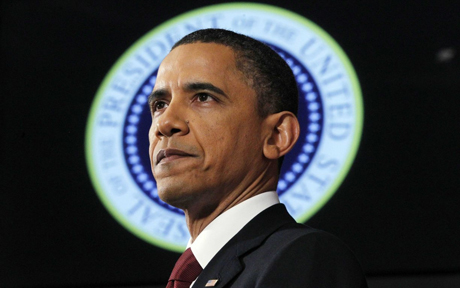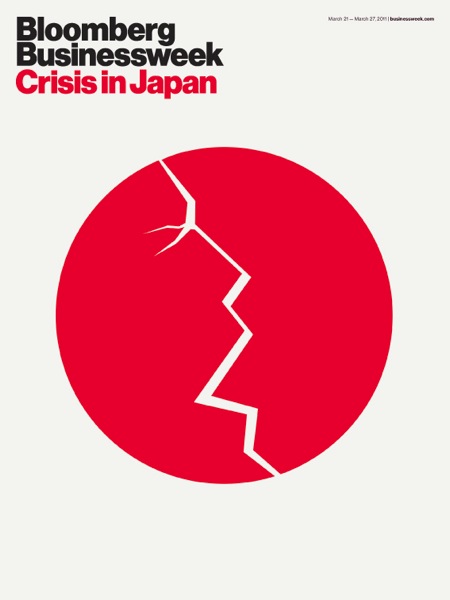Wednesday, March 30, 2011
Silver coin sales and inflationary expectations
Tuesday, March 29, 2011
Another moment in the Obama administration's war on employers
The Obama administration says it wants to promote employment, but by its actions it raises the costs of employment at virtually every opportunity. New regulations, for instance, significantly expand the proportion of the workforce considered "disabled," triggering costly new accommodations. Federal regulators have now sufficiently defined disability down that some experts argue that a majority of American workers may be "disabled." Not only does that directly increase the cost of employing such people, it expands the pool of potential plaintiffs under the Americans with Disabilities Act, creating yet another reason to eliminate jobs, move them overseas, or defer hiring as long as possible.
At this rate, people who create jobs will be the most "disabled" people in America.
(5) Comments
Special Libya speech Caption This!
The Associated Press photography staff is at it again! The Telegraph's caption for this photo is as parve as it gets: "President Barack Obama speaks about Libya." I am quite sure that you, or even your angry drunk of an uncle, can do better.
Feel free to square the halo with this fact-check, also from the Associated Press.
(13) Comments
Charles Schumer slams his foot in his mouth
Charles Schumer, at least, knows whether or not his own foot is tasty:
Sen. Charles Schumer, D-N.Y., a member of the Democratic Senate leadership, got on a conference call with reporters Tuesday morning without realizing the reporters were already listening in. Schumer thought he was on a private line with four Democratic senators who were to talk with reporters about the current budget stalemate.
Schumer instructed the group, made up of Sens. Barbara Boxer of California, Tom Carper of Delaware, Ben Cardin of Maryland and Richard Blumenthal of Connecticut, to tell reporters that the GOP is refusing to negotiate.
He told the group to make sure they label the GOP spending cuts as "extreme."
"I always use extreme, Schumer said. "That is what the caucus instructed me to use."
Someone must have finally told Schumer that the media were listening and he stopped talking midsentence.
Bwahahaha!
(7) Comments
Before the open
Pre-market "color" from securities firm CL King.
• Fed Reserve Bank of St. Louis President James Bullard says the Fed could start to normalize monetary policy before the major geopolitical events are over, but argued none should become “macroeconomic shocks”
• Fed Reserve Bank of Chicago and Bank of Boston Presidents come out in favor of completing QE2 due to low core inflation and high unemployment
• Britain’s GDP fell 0.5% for the last quarter of 2010 underscoring a sluggish recovery
• US and UK officials met with Libya’s opposition leader ahead of Thursday’s conference in London to discuss the allies military intervention in Libya
• ICSC Retail Store Sales reported at +0.2% W/W vs. -0.1% prior; 2.6% Y/Y vs. +3% last week; rough weather, high gas prices, and Easter’s shift to late April made it a tough month for retailers
• Due at 9:00 am – S&P/CaseShiller Home Price Index
• Due at 10:00 am – Consumer Confidence
U.S. Pre-market
S&P Futures +0.21%
Dow Futures +0.18%
Futures continue to lack decisive direction as investors wait the large amount of economic news released throughout this week
Overseas Markets
European markets fall, led by declines in bank stocks that will need to raise capital ahead of stress tests; London -0.10%, Paris -0.26%, Frankfurt -0.52%
Despite better than expected earnings in Asia and Hong Kong, markets fell on concerns over Japan’s economic growth; Japan -0.21%, Hong Kong -0.03%, China -0.87%
Currencies
Yen at 82.1795
Euro at 1.4068
CAD$ at 0.9765
Both the Euro and Dollar strengthen against the Yen as the ECB and Fed are expected to raise interest rates soon while the Bank of Japan is expected to keep rates unchanged
U.S. Treasuries
10yr at 3.46%, up 3bps
30yr at 4.52%, up 3bps
Treasuries continue to fall as investors anticipate a normalizing of Fed Reserve monetary policy after QE2
Oil
Crude down $0.88 to $103.10
Oil drops again on hopes of a resolution in Libya and belief that the Japanese nuclear crisis and European sovereign debt problems will lessen demand
(2) Comments
Monday, March 28, 2011
A "fiscal showdown" over triviliaties
Facing a deficit of $1.65 trillion this year alone, our two national parties are locked in a "fiscal showdown" over whether the spending cuts should be $61 billion or $20 billion. This is sheer craziness, denial and irresponsibility of the very worst sort. We need cuts on the order of many hundreds of billions of dollars in the annual operating budget, and we need drastic reductions in our future obligation to pay "entitlements," itself a term that should be stricken from our national vocabulary. Yes, I would agree to a repeal of the Bush tax cuts -- all of them, not just for the "rich" -- in return for a reduction in federal spending of, say, $800 billion. That strikes me as a reasonable political bargain, and both parties should get right down to the business of making it happen.
(19) Comments
Saturday, March 26, 2011
Seen at the American Museum of Natural History
Last Sunday afternoon the TigerHawk Teenager Son and I went to the American Museum of Natural History for a couple of hours. I spotted this little warning in one of the exhibits. Insofar as it raises at least as many questions as it answers, I suspect there was some small negotiation over its precise wording.
(12) Comments
Saturday afternoon mystery eagle
Let's see how well-traveled and observant y'all are. Where is this eagle? Accuracy scores some prestigious TigerHawk points, but precision scores even more.
(9) Comments
Enemies list
Apart from its opposition to the Democrats, I have a fairly hard time ginning up enthusiasm for the Republican Party as an institution. That is quite a change for me, because I was an energetic Teenage Republican back in Iowa City during the late 1970s, when it was both dorky and futile.
That said, this seems like an excellent reason to pull the GOP lever.
(3) Comments
Geraldine Ferraro has died
From a Washington Post email alert moments ago:
Geraldine Anne Ferraro Zaccaro, 75, passed away Saturday morning at Massachusetts General Hospital, surrounded by her family. The cause of death was complications from multiple myeloma, a blood cancer that she had battled for 12 years.
Ms. Ferraro earned a place in history as the first woman and first Italian-American to run on a major party national ticket, serving as Walter Mondale’s Vice Presidential running mate in 1984 on the Democratic Party ticket.
In her later years, Ms. Ferraro began speaking her mind rather bluntly, reminding me a bit of a great aunt who would defend her moments of, er, candor by declaring "I'm an old woman and I'll say any damned thing I want." I rather liked that.
(10) Comments
Regarding Obama jokes
"Why comedians can't do Obama jokes."
There may, of course, be other reasons why comedians are reluctant to make jokes about Barack Obama.
CWCID: Houston's Clear Thinkers.
(4) Comments
Syria explodes in real time
Of all the various uprisings in the Middle East, it seems to me that the one with the most potential to upset the established order, for good or ill, is the revolt in Syria. There is a great deal going on, and you can follow it in something close to real time at this web site.
Among other potential consequences, the uprising against the Assad regime in Syria may well alter Iranian influence over that country, probably to reduce it but perhaps to increase it. Regarding the latter possibility, Stratfor speculates that the Iranians might intervene to support the regime and thereby reinforce their alliance with Syria.
The ongoing demonstrations in Syria provide an opportunity for Iran to rebuild its leverage in Damascus through offering assistance in crushing the opposition. There are growing indications that Iran is deploying Hezbollah operatives to Syria from the Lebanese village of Dayr al Asaher to assist in the crackdowns.
Then again, Hezbollah might decide that its interests were best served by attacking Israel, which might have the added benefit of spinning anti-regime demonstrations throughout the Arab world in to anti-Israel/American rage, always a favorite for Hez and its patrons in Tehran. And another Israeli-Hezbollah war would provoke nationalism in some Syrians and fear in others, both of which emotions might work in favor of the Assad regime.
Release the hounds.
(5) Comments
One political debate I would be eager to see
Just when you can't stand politics anymore, a story like this comes along to restore your faith in the system:
Ex-madam and former New York gubernatorial candidate Kristin Davis is considering a run against former New York Democratic Gov. Eliot Spitzer if he enters the race for mayor of New York City in 2013.
“If Spitzer throws his black socks in the ring I may have to throw in my lacy brassiere,” Davis said in a statement sent to The Daily Caller.
Spitzer, who hosts “In the Arena” on CNN, was a prominent customer of Davis’ escort business known as “client 9.” Public revelation of his patronage forced his resignation from the governorship in 2008.
“I had pretty much decided to focus on the sex trafficking issue and not to run for public office again [after the 2010 gubernatorial election],” said Davis. “Running for Governor was great fun and very educational but I decided to pursue advocacy activity and some entrepreneurial efforts in legal industries.”
“The one thing that could probably get me off the bench is a Mayor candidacy by Eliot Spitzer. I’d have to look at it. The opportunity to expose the inequality in our Justice system may be too great,” Davis said.
For those of you who believe that it is important to see a picture of Ms. Davis before finalizing your own opinions, look here (arguably SFW, but turn off your speakers).
(2) Comments
Annals of Arab propaganda
Remember "Baghdad Bob"? Meet Damascus Dan!
You have to hand it to the Arab dictators. They do not go in for lying half way. They live their lies to the fullest.
(1) Comments
Friday, March 25, 2011
News before the open
Pre-open "color" from securities firm CL King:
(4) Comments
AGW Debunkification
The Heartland Institute, which is a market-oriented think tank with institutional doubts about the anthropogenic global warming hypothesis, has a nice round-up of articles from apparently respectable scientific journals that tend to debunk important aspects of the climate "alarmist" case.
(0) Comments
Thursday, March 24, 2011
Three cheers for the blue, white, and red
Heh:
Unlike many American conservatives, I usually enjoy French interventionism. Oh, sure, occasionally it goes horribly awry, but the French can often do important or merely entertaining things that we cannot or will not do. You know, like sinking the Rainbow Warrior, which was totally harsh, obviously unlawful, and -- I'm not going to lie -- hilarious. Recently, the French have led the way in the killing of North African pirates, a contribution to world peace if there ever was one. There were many such examples during the Cold War. Yes, the French can be annoying when they seek to frustrate American objectives, but that same strong sense of national identity and underlying Gallic harshness leads them to do at least some of the world's dirty work. I am one American who appreciates that.
(11) Comments
Radiation

I don't know how widespread this chart is already, but I figured it would be interesting for those who haven't seen it.
(3) Comments
Wednesday, March 23, 2011
Pro-corporation quotation of the month
What winner of the Nobel Peace Prize and president of an Ivy League university said this?
The limited liability corporation is the greatest single discovery of modern times. Even steam and electricity are less important than the limited liability company.
Answer, and more along the same lines, here.
(3) Comments
Regarding "disappearing comments"
A number of you have been griping about "disappearing comments." At first I thought it was Blogger glitchiness of some sort, but rather it seems that Blogger (which is Google in disguise) has tightened its "spam" filter. I went back through the filter and released a bunch of the recent legitimate comments, and will make a habit of checking regularly from now on to avoid the problem in the future. Let me know if it persists.
(1) Comments
Bullet dodged: "Card check" is deader than a dead parrot
It will no doubt surprise and please you that the Democrats seem to have missed an opportunity to subtract from our national wealth. "Card check" -- the workplace "election" of a union through open rather than secret ballot -- is dead (lest that was not obvious after November). Liberals argue that you need "card check" -- essentially an election without an election -- because otherwise employers will intimidate workers in to voting against the union. Of course, it is also possible that in many modern workplaces people prefer meritocracy, which they know is inherently incompatible with unionization.
Either way, the defeat of card check is a victory for the general interest against special interests, and for our posterity.
(6) Comments
If one had a huge amount of money...
If one had so much money that one would not notice spending $900,000, one might want to buy this car. You know, because of its awesome gas mileage.
(2) Comments
Tuesday, March 22, 2011
Morning read: Stratfor on "Libya, the West, and the Narrative of Democracy"
For your morning digestion, we have reproduced below Stratfor's report (reproduced with permission) on the intervention in Libya and the perhaps confused rationale therefor. Among other things, the ex ante reasoning appears flimsier than for either invasion of Iraq -- Libya not representing a meaningful external threat -- and even for Kosovo, the main difference from the former case involving the use of ground troops which portend occupation. Of course, there is no reason to believe that Libya will not require occupation when all is said and done.
We have heard no explanation for how the Libya intervention fits in to the core objectives of American foreign policy under Barack Obama, although that is not very surprising since (with three exceptions relating to energy security, climate change, and preventing nuclear proliferation) Obama's foreign policy objectives are more an "I'm not Bush" to-do list than an actual strategy.
My own suspicion is that the Obama administration is most worried about a humanitarian disaster akin to Rwanda -- not so much that it would happen, but that something that could be compared to Rwanda would happen on Barack Obama's watch in a country easily accessible to the United States Navy. That, and it never looks good for a Democratic president, who have all since the Carter years been at risk of looking soft, to be less hawkish than the French.
Richard Fernandez of The Belmont Club is, by the way, at least as baffled as I am, and points to the various ways in which this intervention could unfold quite badly for the United States, including scenarios that would directly offend the putative objectives of American foreign policy under Obama.
But Washington will not escape unscathed. By weirdly going along with the Paris and London only to leave them in the lurch Washington will humiliate its strongest allies in Europe. The damage to NATO and the Western alliance will be considerable, even leaving aside Turkey’s feelings. It will call into question whether America can still be relied on to be the regional hegemon, a question that is being asked all over the world...
The goal of aspiring regional powers is simple: to scatter US alliances in the area, either with a view to Finlandizing them or getting them to switch allegiances. And here is Barack Obama, handing it to them on a silver platter. By letting France and Britain get on the carpet then yanking it out from under them, Barack and Hillary are doing a phenomenally effective job of destroying the faith their predecessors sought to build.
In every part of the periphery allies are asking themselves: can we trust Obama?
This is at least a little ironic, since "re-energizing America's alliances" is one of the "guiding principles" of American foreign policy under Obama.
Anyway, read Stratfor (below) and Fernandez, and then please comment.
Forces from the United States and some European countries have intervened in Libya. Under U.N. authorization, they have imposed a no-fly zone in Libya, meaning they will shoot down any Libyan aircraft that attempts to fly within Libya. In addition, they have conducted attacks against aircraft on the ground, airfields, air defenses and the command, control and communication systems of the Libyan government, and French and U.S. aircraft have struck against Libyan armor and ground forces. There also are reports of European and Egyptian special operations forces deploying in eastern Libya, where the opposition to the government is centered, particularly around the city of Benghazi. In effect, the intervention of this alliance has been against the government of Moammar Gadhafi, and by extension, in favor of his opponents in the east.The alliance’s full intention is not clear, nor is it clear that the allies are of one mind. The U.N. Security Council resolution clearly authorizes the imposition of a no-fly zone. By extension, this logically authorizes strikes against airfields and related targets. Very broadly, it also defines the mission of the intervention as protecting civilian lives. As such, it does not specifically prohibit the presence of ground forces, though it does clearly state that no “foreign occupation force” shall be permitted on Libyan soil. It can be assumed they intended that forces could intervene in Libya but could not remain in Libya after the intervention. What this means in practice is less than clear.
There is no question that the intervention is designed to protect Gadhafi’s enemies from his forces. Gadhafi had threatened to attack “without mercy” and had mounted a sustained eastward assault that the rebels proved incapable of slowing. Before the intervention, the vanguard of his forces was on the doorstep of Benghazi. The protection of the eastern rebels from Gadhafi’s vengeance coupled with attacks on facilities under Gadhafi’s control logically leads to the conclusion that the alliance wants regime change, that it wants to replace the Gadhafi government with one led by the rebels.
But that would be too much like the invasion of Iraq against Saddam Hussein, and the United Nations and the alliance haven’t gone that far in their rhetoric, regardless of the logic of their actions. Rather, the goal of the intervention is explicitly to stop Gadhafi’s threat to slaughter his enemies, support his enemies but leave the responsibility for the outcome in the hands of the eastern coalition. In other words — and this requires a lot of words to explain — they want to intervene to protect Gadhafi’s enemies, they are prepared to support those enemies (though it is not clear how far they are willing to go in providing that support), but they will not be responsible for the outcome of the civil war.
The Regional Context
To understand this logic, it is essential to begin by considering recent events in North Africa and the Arab world and the manner in which Western governments interpreted them. Beginning with Tunisia, spreading to Egypt and then to the Arabian Peninsula, the last two months have seen widespread unrest in the Arab world. Three assumptions have been made about this unrest. The first was that it represented broad-based popular opposition to existing governments, rather than representing the discontent of fragmented minorities — in other words, that they were popular revolutions. Second, it assumed that these revolutions had as a common goal the creation of a democratic society. Third, it assumed that the kind of democratic society they wanted was similar to European-American democracy, in other words, a constitutional system supporting Western democratic values.
Each of the countries experiencing unrest was very different. For example, in Egypt, while the cameras focused on demonstrators, they spent little time filming the vast majority of the country that did not rise up. Unlike 1979 in Iran, the shopkeepers and workers did not protest en masse. Whether they supported the demonstrators in Tahrir Square is a matter of conjecture. They might have, but the demonstrators were a tiny fraction of Egyptian society, and while they clearly wanted a democracy, it is less than clear that they wanted a liberal democracy. Recall that the Iranian Revolution created an Islamic Republic more democratic than its critics would like to admit, but radically illiberal and oppressive. In Egypt, it is clear that Mubarak was generally loathed but not clear that the regime in general was being rejected. It is not clear from the outcome what will happen now. Egypt may stay as it is, it may become an illiberal democracy or it may become a liberal democracy.
Consider also Bahrain. Clearly, the majority of the population is Shiite, and resentment toward the Sunni government is apparent. It should be assumed that the protesters want to dramatically increase Shiite power, and elections should do the trick. Whether they want to create a liberal democracy fully aligned with the U.N. doctrines on human rights is somewhat more problematic.
Egypt is a complicated country, and any simple statement about what is going on is going to be wrong. Bahrain is somewhat less complex, but the same holds there. The idea that opposition to the government means support for liberal democracy is a tremendous stretch in all cases — and the idea that what the demonstrators say they want on camera is what they actually want is problematic. Even more problematic in many cases is the idea that the demonstrators in the streets simply represent a universal popular will.
Nevertheless, a narrative on what has happened in the Arab world has emerged and has become the framework for thinking about the region. The narrative says that the region is being swept by democratic revolutions (in the Western sense) rising up against oppressive regimes. The West must support these uprisings gently. That means that they must not sponsor them but at the same time act to prevent the repressive regimes from crushing them.
This is a complex maneuver. The West supporting the rebels will turn it into another phase of Western imperialism, under this theory. But the failure to support the rising will be a betrayal of fundamental moral principles. Leaving aside whether the narrative is accurate, reconciling these two principles is not easy — but it particularly appeals to Europeans with their ideological preference for “soft power.”
The West has been walking a tightrope of these contradictory principles; Libya became the place where they fell off. According to the narrative, what happened in Libya was another in a series of democratic uprisings, but in this case suppressed with a brutality outside the bounds of what could be tolerated. Bahrain apparently was inside the bounds, and Egypt was a success, but Libya was a case in which the world could not stand aside while Gadhafi destroyed a democratic uprising. Now, the fact that the world had stood aside for more than 40 years while Gadhafi brutalized his own and other people was not the issue. In the narrative being told, Libya was no longer an isolated tyranny but part of a widespread rising — and the one in which the West’s moral integrity was being tested in the extreme. Now was different from before.
Of course, as with other countries, there was a massive divergence between the narrative and what actually happened. Certainly, that there was unrest in Tunisia and Egypt caused opponents of Gadhafi to think about opportunities, and the apparent ease of the Tunisian and Egyptian uprisings gave them some degree of confidence. But it would be an enormous mistake to see what has happened in Libya as a mass, liberal democratic uprising. The narrative has to be strained to work in most countries, but in Libya, it breaks down completely.
The Libyan Uprising
As we have pointed out, the Libyan uprising consisted of a cluster of tribes and personalities, some within the Libyan government, some within the army and many others longtime opponents of the regime, all of whom saw an opportunity at this particular moment. Though many in western portions of Libya, notably in the cities of Zawiya and Misurata, identify themselves with the opposition, they do not represent the heart of the historic opposition to Tripoli found in the east. It is this region, known in the pre-independence era as Cyrenaica, that is the core of the opposition movement. United perhaps only by their opposition to Gadhafi, these people hold no common ideology and certainly do not all advocate Western-style democracy. Rather, they saw an opportunity to take greater power, and they tried to seize it.
According to the narrative, Gadhafi should quickly have been overwhelmed — but he wasn’t. He actually had substantial support among some tribes and within the army. All of these supporters had a great deal to lose if he was overthrown. Therefore, they proved far stronger collectively than the opposition, even if they were taken aback by the initial opposition successes. To everyone’s surprise, Gadhafi not only didn’t flee, he counterattacked and repulsed his enemies.
This should not have surprised the world as much as it did. Gadhafi did not run Libya for the past 42 years because he was a fool, nor because he didn’t have support. He was very careful to reward his friends and hurt and weaken his enemies, and his supporters were substantial and motivated. One of the parts of the narrative is that the tyrant is surviving only by force and that the democratic rising readily routs him. The fact is that the tyrant had a lot of support in this case, the opposition wasn’t particularly democratic, much less organized or cohesive, and it was Gadhafi who routed them.
As Gadhafi closed in on Benghazi, the narrative shifted from the triumph of the democratic masses to the need to protect them from Gadhafi — hence the urgent calls for airstrikes. But this was tempered by reluctance to act decisively by landing troops, engaging the Libyan army and handing power to the rebels: Imperialism had to be avoided by doing the least possible to protect the rebels while arming them to defeat Gadhafi. Armed and trained by the West, provided with command of the air by the foreign air forces — this was the arbitrary line over which the new government keeps from being a Western puppet. It still seems a bit over the line, but that’s how the story goes.
In fact, the West is now supporting a very diverse and sometimes mutually hostile group of tribes and individuals, bound together by hostility to Gadhafi and not much else. It is possible that over time they could coalesce into a fighting force, but it is far more difficult imagining them defeating Gadhafi’s forces anytime soon, much less governing Libya together. There are simply too many issues between them. It is, in part, these divisions that allowed Gadhafi to stay in power as long as he did. The West’s ability to impose order on them without governing them, particularly in a short amount of time, is difficult to imagine. They remind me of Hamid Karzai in Afghanistan, anointed by the Americans, distrusted by much of the country and supported by a fractious coalition.
Other Factors
There are other factors involved, of course. Italy has an interest in Libyan oil, and the United Kingdom was looking for access to the same. But just as Gadhafi was happy to sell the oil, so would any successor regime be; this war was not necessary to guarantee access to oil. NATO politics also played a role. The Germans refused to go with this operation, and that drove the French closer to the Americans and British. There is the Arab League, which supported a no-fly zone (though it did an about-face when it found out that a no-fly zone included bombing things) and offered the opportunity to work with the Arab world.
But it would be a mistake to assume that these passing interests took precedence over the ideological narrative, the genuine belief that it was possible to thread the needle between humanitarianism and imperialism — that it was possible to intervene in Libya on humanitarian grounds without thereby interfering in the internal affairs of the country. The belief that one can take recourse to war to save the lives of the innocent without, in the course of that war, taking even more lives of innocents, also was in play.
The comparison to Iraq is obvious. Both countries had a monstrous dictator. Both were subjected to no-fly zones. The no-fly zones don’t deter the dictator. In due course, this evolves into a massive intervention in which the government is overthrown and the opposition goes into an internal civil war while simultaneously attacking the invaders. Of course, alternatively, this might play out like the Kosovo war, where a few months of bombing saw the government surrender the province. But in that case, only a province was in play. In this case, although focused ostensibly on the east, Gadhafi in effect is being asked to give up everything, and the same with his supporters — a harder business.
In my view, waging war to pursue the national interest is on rare occasion necessary. Waging war for ideological reasons requires a clear understanding of the ideology and an even clearer understanding of the reality on the ground. In this intervention, the ideology is not crystal clear, torn as it is between the concept of self-determination and the obligation to intervene to protect the favored faction. The reality on the ground is even less clear. The reality of democratic uprisings in the Arab world is much more complicated than the narrative makes it out to be, and the application of the narrative to Libya simply breaks down. There is unrest, but unrest comes in many sizes, democratic being only one.
Whenever you intervene in a country, whatever your intentions, you are intervening on someone’s side. In this case, the United States, France and Britain are intervening in favor of a poorly defined group of mutually hostile and suspicious tribes and factions that have failed to coalesce, at least so far, into a meaningful military force. The intervention may well succeed. The question is whether the outcome will create a morally superior nation. It is said that there can’t be anything worse than Gadhafi. But Gadhafi did not rule for 42 years because he was simply a dictator using force against innocents, but rather because he speaks to a real and powerful dimension of Libya.
Release the hounds.
(32) Comments
Monday, March 21, 2011
Is Silicon Valley coming back?
More than anything else, the American economy needs a return of "animal spirits," the ineffable ingredient necessary to turn ideas -- which are always rife -- in to businesses that change the world and, by the by, create jobs. No part of the country has done that more in the last generation than Silicon Valley, which by most accounts has not been its exciting and animalistic self in recent years. Moneyblogger Paul Kedrosky says that is changing, "The Top Ten Signs the Valley is on Tilt Again." More of that, please, except perhaps for the part about Harvard MBAs.
(0) Comments
Sunday, March 20, 2011
The news gets better from Fukushima
Here's a nice summary of the current status of the Fukushima nuke> Nut 'graphs:
Last Saturday the the crisis level at the Fukushima Daiichi nuclear power station was rapidly on the rise. Hydrogen explosions, cracks in the wetwell torus and fires in a shutdown unit’s building — it seemed the sequence of new problems would never end. A week later, the situation remains troubling, but, over the last few days, it has not got any worse. Indeed, one could make a reasonable argument that it’s actually got better.
Yes, the IAEA has now formally listed the overall accident at an INES level 5 (see here for a description of the scales), up from the original estimate of 4. This is right and proper — but it doesn’t mean the situation has escalated further, as some have inferred. Here is a summary of the main site activities for today, followed by the latest JAIF and FEPC reports.
Read the whole thing. Unless all your attention is focused on Libya...
(3) Comments
Saturday, March 19, 2011
Portrait of Manhattan as a young drink
Friday, March 18, 2011
Graphic artistry of the day
A note on yesterday's game
For those of you who saw yesterday's thrilling Princeton/Kentucky men's basketball game, this report captures the moment well:
The surprise wasn’t that Princeton could play with the big boys this time of year — the Tigers are famous for doing that...
No, that they were right there with Kentucky wasn’t the surprise. It was how they were there.
Most of America probably turned on CBS on Thursday afternoon expecting to see the Princeton of years past — the team that walked the ball up the court, drained every last second from the shot clock and tried to kill an opponent with those perfect back-door layups.
That team is as much a part of the past as Chuck Taylor high-tops. Johnson spent much of this game begging his team to push the tempo, to take this game directly at Kentucky.
Kentucky, the team that has become the farm system for one-and-done college players, was outrebounded, 28-26. Kentucky, the team that was supposed to have such a wide advantage athletically, actually had four fewer fast-break points than the Ivy League champs. Kentucky, a team that averaged 75.9 points, scored just 59 against a physical Princeton defense.
Bingo. We're back, and it's different this time.
Now let's schedule a few big teams in November and December -- if they have the stones -- and do it again next year.
(1) Comments
Thursday, March 17, 2011
In recognition of the day
A Facebook friend, in Dublin as I write this, just posted this portrait of Arthur Guinness (Wikipedia bio) to his Wall.
Dude knew how to brew beer. I have already enjoyed two in the spirit of the day, and, of course, I have some minor heartbreak which I need to get over.
(5) Comments
How Princeton basketball found itself
On the eve of tomorrow's first round game against the Wildcats of Kentucky, a nice video from the Wall Street Journal -- yeah, I know, pretty appropriate -- about the return of Princeton basketball under coach Sydney Johnson.
(1) Comments
Wednesday, March 16, 2011
Oh no. More eliminationist rhetoric sarcasm
If, like me, you deal with tragedy with nervous humor, this is priceless.
I don't care who you are, that's gotta sting.
CWCID: Glenn Reynolds.
(10) Comments
Tuesday, March 15, 2011
United States federal spending, with healthcare and defense broken out
Since we are in the middle of what will probably be a generations long "national conversation" about the role of government and the magnitude of federal spending, perhaps the following chart (courtesy of Mindles' Facebook scroll), which is expressed in constant (inflation-adjusted) 2005 dollars, disposes of a few myths. Defense is not the issue; it has barely budged in constant per capita burden. Health care has become and will continue to be a much bigger weight, which is why we needed some massive reform of the system of health care finance (without necessarily conceding that the version we got will cut costs). But take a look at everything else, which includes Social Security and just about every other damned thing you might think of. It would take a roughly 33% reduction in total spending just to get us back to the per capita (not absolute) level of 1995.
Much scarier stuff along the same lines, here.
I blame George W. Bush and Barack Obama, Tom DeLay, Trent Lott, Nancy Pelosi, and Harry Reid. Not necessarily in that order.
(16) Comments
Tuesday afternoon evocation of the tabs
From my perch at the Great Lakes Brewing Company bar across from Gate C14 in Cleveland-Hopkins airport, a few quick hits for your reading pleasure. The short version: Beware the Ides of March.
While you were watching Japan, Iran has been making trouble in the Middle East.
Israeli naval commandos on Tuesday seized a cargo ship in the Mediterranean carrying what Prime Minister Benjamin Netanyahu said were Iranian-supplied weapons intended for Palestinian militants in the Gaza Strip....
An Israeli military spokesman said an initial search turned up three containers loaded with arms and more cargo would be examined after the ship reached Israel.
The Iranians run extensive covert operations throughout the region, both directly and through proxies. Here is what Stratfor had to say about the Iranian agenda in Bahrain in the wake of the intervention of the Saudis yesterday:
Thus far, the Iranians have relied on their strengths in the covert arena to pursue their agenda in Bahrain and the wider Persian Gulf region. This is a space that Iran feels comfortable operating in, as it is a relatively low-risk and potentially high-reward method of realizing its strategic objectives. For Bahrain specifically, Iran has relied on its political, business and militant links to block negotiations between the Shiite opposition and the royal Sunni al-Khalifa family, escalate the protests, and instigate sectarian clashes to transform Bahraini political unrest to a charged sectarian affair that could potentially reshape the balance of power in eastern Arabia in favor of the Shia....
A number of operatives trained in Iran and Lebanon in urban warfare are believed to be mixed in with the various Shiite opposition groups, both in the moderate Al Wefaq and the hard-line Coalition for a Republic, composed of the Haq movement, the Wafa movement and the lesser-known, London-based Bahrain Islamic Freedom Movement. According to a STRATFOR source, Bahraini Hezbollah, established in 1985 with the help of Hadi al-Madrasi, has been the premier underground militant organization in Bahrain, operating in coordination with the Islamic Revolutionary Guard Corps’ (IRGC) Quds Force. Hadi al-Madrasi has allegedly spent the past several years arming and supplying Bahraini Hezbollah through weapons purchases from Iraq. A STRATFOR source claims several IRGC operatives have also deployed on the Arab side of the Persian Gulf under the guise of laborers.
The Iranians have experience in supporting proxies like Hezbollah at much greater distances than Bahrain and could increase supplies of arms, materiel, training and other means of support to the hard-line Shiite opposition in Bahrain concealed in the day-to-day flow of commerce and civilian travel. However, the GCC states are cracking down on Shiite movements in Bahrain and are trying to restrict Iran’s access to the country. This would be difficult to sustain indefinitely, but it could reduce Iran’s options and influence in the short term.
Now that the GCC states, led by Saudi Arabia, are making a direct military intervention on behalf of the Bahraini royal family, the Iranian covert action strategy for Bahrain is hitting a roadblock. Iran has a number of dedicated and trained operatives that might be willing to incur casualties in confrontations with Bahrain’s reinforced security presence, but the majority of the Shiite opposition in Bahrain is unlikely to undergo great risk unless it has the assurance of an outside backer. The Iranians are now confronted with a number of unattractive options in their efforts to both sustain the momentum of Shiite unrest in eastern Arabia while also avoiding becoming entangled in much riskier overt options. In the case of Bahrain, Iran does not appear to be limited in covert assets, but has a broader strategic dilemma to consider in determining its next moves.
In short, this moment's geopolitical risks are large. Here is to hoping that the Obama administration is not entirely engaged in filling out its brackets.
From the Motley Fool, three ways to profit from the current crisis. Hey, if Rahm Emanuel can say it, why can't I?
Japan's nuclear crisis: A timeline of key events.
In the category of genuine heroes, include these dudes.
TTYL.
(0) Comments
The one bracket Princeton can win
Here is what would happen if the NCAA men's basketball brackets were resolved according to the post-graduation salaries of each participating school.
Brings to mind the classic and exceedingly snotty Northwestern University cheer from the 1970s (delivered, typically, when Ohio State racked up its eighth touchdown of the afternoon): "That's alright, that's OK, you'll be working for us some day!"
(12) Comments
Sunday, March 13, 2011
Investments you wish you had made
In the category of investments you wish you had made, consider Apple Computer. If you had invested money in the company instead of buying its products on the day they were released, this nifty table shows you the profits you would have earned. So, for instance, if instead of buying an original iPod in January 2001 for $399 you had invested that amount in Apple stock, it would be worth a hair under $12,000 today. And God forbid you bought an original Powerbook in October 1997 instead of buying shares. The $5700 you squandered to be cool would be worth more than $330,000 today.
CWCID: Ritholtz, who noticed that "this doesn't work with every company. You could have purchased stock in GM, Wang or Planet Hollywood instead of buying their products . . .."
(2) Comments
Japan: The hits just keep coming
Just when you're thinking Japan has taken all nature can dish out, a volcano erupts. And if you do not yet appreciate the scale of the destruction, check out these "before and after" satellite pictures of coastal Japan. All of which makes it in very poor taste for me to remember the National Lampoon's Sunday Newspaper parody from, oh, 30 or so years ago.
Egads.
(3) Comments
The hyper-reductionist case against the nanny state
We are, as a nation and a people, deeply in debt. This is the result of a great many Americans consuming, over the course of their lives, more than they produce. To get out of this problem, we need the proportion of people who produce more than they consume to become larger or for their aggregate overproduction to become so great that it exceeds the aggregate overconsumption of those people who are in deficit. Since the second solution -- which is essentially greater income inequality between the dwindling pool of producers and the growing burden of consumers* -- results in more social dislocation than the former, our government's policies ought to encourage a higher proportion of our citizens to produce more than they consume, not just this year but over the course of their lives. Transfer payments from overproducers to overconsumers promote the opposite objective, because they raise the burdens on producers and encourage people to consume without producing. We should therefore only transfer money to people if their circumstances are dire, and in any case it should be done in a way that will encourage long-term productivity. Culturally, we would do well to remember that the people who do the work in our economy make everything else -- including all that excess consumption by the debtor class -- possible.
With that in mind, here is a colonial era law that we might consider resurrecting.
_________________________________
*"Producers" in this post are people who produce more than they consume over the course of their lives whether or not they personally capture the benefit, and "consumers" are the opposite. Therefore, by these terms I do not mean a simple calculation of the differential in net worth at beginning and end. There are tremendous producers who keep very little of their contribution -- great teachers, for example, generate massive positive externalities that they do not capture on their own balance sheet -- and "consumers" who amass huge wealth by gaming the system to siphon wealth in their own direction. Some trial lawyers and politicians doubtless fall in this category. I am sure you can think of others. You may even be related to them.
(12) Comments
Apparently rock hard abs are overrated
The shot
For those of you who missed yesterday's spectacular playoff between Princeton and Harvard -- co-champions of the Ivy League in men's basketball this year -- for the conference's automatic bid to the NCAA Tournament, here is how it ended:
A nice still, courtesy of the New York Times:
Harvard has an excellent team and played a decent schedule, so it is not inconceivable that it may get an unprecedented second Ivy League tournament berth. The odds are not high, but there will certainly be worse teams that do get in.
(5) Comments
Saturday, March 12, 2011
States of shame
It turns out every state is the worst at something. It will surprise absolutely nobody who lives here that New Jersey has the highest taxes. While that is a bad thing in which to excel, it is not the worst thing in which to excel. See, e.g., North Dakota.
(11) Comments
Tigers at the buzzer!
Princeton wins a ticket to the big dance with 0.2 seconds on the clock...
The drought is over. Egads, that was a painful seven years.
(3) Comments
Quietly, the Obama administration approves more offshore drilling
The suspension of Japanese nuclear power will increase demand for oil and therefore its price, just as the Arab "street" books up its calendar with "days of rage." Coincidentally or not, the Obama administration has started clearing more deepwater drilling in the Gulf of Mexico after months of a de jure and then de facto suspension that drove big rigs to more hospitable climes. One is forced to wonder whether the decision to resume drilling is any more based in "science" than the decision to suspend it was. Which, for those of you keeping track at home, was not at all.
The Obama White House is a candle in the political wind.
(7) Comments
Question for our readers: How will Japan change?
I do not know very much about Japan. I was there for a couple of weeks as a student more than 25 years ago, and have returned a couple of times on business since, but I do not know very much more than I can read in The Economist about Japanese society and its political culture. That said, it is hard to believe that a disaster of this magnitude will not have massive political consequences. How will the Japanese respond to this? Will the disaster depress the Japanese, who have already been struggling a bit for national purpose -- economic, cultural, and geopolitical -- since the end of, well, the post-war era? Or will it overturn the old order and reinvigorate Japan, making it more forward-looking and assertive?
Release the hounds.
(8) Comments
"Meltdown" in Japan: Implications for energy policy
A Japanese nuclear power plant has exploded following yesterday's earthquake just off shore. Video:
Stratfor is calling it a "meltdown," and its report is reproduced here with permission (short commentary follows).
A March 12 explosion at the earthquake-damaged Fukushima Daiichi nuclear power plant in Okuma, Japan, appears to have caused a reactor meltdown.
The key piece of technology in a nuclear reactor is the control rods. Nuclear fuel generates neutrons; controlling the flow and production rate of these neutrons is what generates heat, and from the heat, electricity. Control rods absorb neutrons — the rods slide in and out of the fuel mass to regulate neutron emission, and with it, heat and electricity generation.
A meltdown occurs when the control rods fail to contain the neutron emission and the heat levels inside the reactor thus rise to a point that the fuel itself melts, generally temperatures in excess of 1,000 degrees Fahrenheit, causing uncontrolled radiation-generating reactions and making approaching the reactor incredibly hazardous. A meltdown does not necessarily mean a nuclear disaster. As long as the reactor core, which is specifically designed to contain high levels of heat, pressure and radiation, remains intact, the melted fuel can be dealt with. If the core breaches but the containment facility built around the core remains intact, the melted fuel can still be dealt with — typically entombed within specialized concrete — but the cost and difficulty of such containment increases exponentially.
(click here to enlarge image)
However, the earthquake in Japan, in addition to damaging the ability of the control rods to regulate the fuel — and the reactor’s coolant system — appears to have damaged the containment facility, and the explosion almost certainly did. There have been reports of “white smoke,” perhaps burning concrete, coming from the scene of the explosion, indicating a containment breach and the almost certain escape of significant amounts of radiation.
At this point, events in Japan bear many similarities to the 1986 Chernobyl disaster. Reports indicate that up to 1.5 meters (4.9 feet) of the reactor fuel was exposed. The reactor fuel appears to have at least partially melted, and the subsequent explosion has shattered the walls and roof of the containment vessel — and likely the remaining useful parts of the control and coolant systems.
(click here to enlarge image)And so now the question is simple: Did the floor of the containment vessel crack? If not, the situation can still be salvaged by somehow re-containing the nuclear core. But if the floor has cracked, it is highly likely that the melting fuel will burn through the floor of the containment system and enter the ground. This has never happened before but has always been the nightmare scenario for a nuclear power event — in this scenario, containment goes from being merely dangerous, time consuming and expensive to nearly impossible.
Radiation exposure for the average individual is 620 millirems per year, split about evenly between manmade and natural sources. The firefighters who served at the Chernobyl plant were exposed to between 80,000 and 1.6 million millirems. The Nuclear Regulatory Commission estimates that exposure to 375,000 to 500,000 millirems would be sufficient to cause death within three months for half of those exposed. A 30-kilometer-radius (19 miles) no-go zone remains at Chernobyl to this day. Japan’s troubled reactor site is about 300 kilometers from Tokyo.
The latest report from the damaged power plant indicated that exposure rates outside the plant were at about 620 millirems per hour, though it is not clear whether that report came before or after the reactor’s containment structure exploded.
Commentary
It is not yet clear how damaging this accident will turn out to be. The Associated Press has rounded up Russians who do not seem too worried about it:
Yaroslov Shtrombakh, a Russian nuclear expert, said a Chernobyl-style meltdown was unlikely.
"It's not a fast reaction like at Chernobyl," he said. "I think that everything will be contained within the grounds, and there will be no big catastrophe."
The Japanese government, which is said not to have been entirely forthcoming about nuclear accidents in the past -- and what government has been? -- also says that a big-time radiation spew is not in the offing.
Regardless, however, this disaster is likely to have short and long-term consequences for energy prices and policy. Even before the explosion the business press was reporting that the shutting down of the Japanese nuclear power system would create substantial incremental demand for oil:
The Japan earthquake has shut an estimated 6,800 megawatts of nuclear power generation, or 15%-20% of Japan's capacity, and while it isn't clear how long outages will last, there could be considerable fuel substitution, which in turn could drive up prices of alternative fuels, according to a Barclay Capital analysis published Saturday.
If the shuttered nuclear capacity was replaced only by additional fuel oil consumption, it would require an additional 238,000 barrels a day, it said.
Longer term, it would be very surprising if this event, however it plays out, did not reinvigorate opposition to nuclear power in other rich countries, including particularly the United States. Expect the anti-nuclear environmental groups to make as much political hay out of this as they can, as soon as possible. That, in turn, will put even more pressure on the argument over the causes and forecasted consequences of anthropogenic global warming, because the standard of living of the developed world will be at stake.
(26) Comments
Friday, March 11, 2011
A short note on the sunset of gallantry
Via the always entertaining Good Shit (main page decidedly NSFW):
ONE OF THE LEAST VISITED memorials in Washington is a waterfront statue commemorating the men who died on the Titanic. Seventy-four percent of the women passengers survived the April 15, 1912, calamity, while 80 percent of the men perished. Why? Because the men followed the principle "women and children first."
The monument, an 18-foot granite male figure with arms outstretched to the side, was erected by "the women of America" in 1931 to show their gratitude. The inscription reads: "To the brave men who perished in the wreck of the Titanic. . . . They gave their lives that women and children might be saved."
Today, almost no one remembers those men. Women no longer bring flowers to the statue on April 15 to honor their chivalry. The idea of male gallantry makes many women nervous, suggesting (as it does) that women require special protection. It implies the sexes are objectively different. It tells us that some things are best left to men. Gallantry is a virtue that dare not speak its name.
Is the end of gallantry progress, or regression? While I immerse myself in what promises to be another very long day, discuss amongst yourselves.
(16) Comments
Thursday, March 10, 2011
Tiger picture of the day
Here's to you, real arguments of genius!
"We must close union offices, confiscate their money and put their leaders in prison. We must reduce workers salaries and take away their right to strike" - Adolf Hitler, May 2, 1933.
-handling it as if it dripped with current relevance, and as if eliminating mandatory dues withholding were akin to putting people in prison. I can't find the cite, but stipulating that it is real, it proves....what exactly? Let's see what other non-dispositive things Hitler apparently said:
The reality is his attitude towards unions was a bit more complicated:
I am convinced that we cannot possibly dispense with the trades unions. On the contrary, they are among the most important institutions in the economic life of the nation. Not only are they important in the sphere of social policy but also, and even more so, in the national political sphere. For when the great masses of a nation see their vital needs satisfied through a just trade unionist movement the stamina of the whole nation in its struggle for existence will be enormously reinforced thereby.
Before everything else, the trades unions are necessary as building stones for the future economic parliament, which will be made up of chambers representing the various professions and occupations.
We are socialists, we are enemies of today’s capitalistic economic system for the exploitation of the economically weak, with its unfair salaries, with its unseemly evaluation of a human being according to wealth and property instead of responsibility and performance, and we are determined to destroy this system under all conditions.
It is thus necessary that the individual should finally come to realize that his own ego is of no importance in comparison with the existence of the nation, that the position of the individual is conditioned solely by the interests of the nation as a whole.
This year will go down in history. For the first time, a civilized nation has full gun registration! Our streets will be safer, our police more efficient, and the world will follow our lead into the future." --Adolf Hitler, 1935
Why nationalize industry when you can nationalize the people?
“I use emotion for the many and reserve reason for the few”
At that time I had, and I still have today, a firmly rooted conviction that when one is engaged in a great ideological struggle in the political field it would be a grave mistake to mix up economic questions with this struggle in its earlier stages. This applies particularly to our German people. For if such were to happen in their case the economic struggle would immediately distract the energy necessary for the political fight. Once the people are brought to believe that they can buy a little house with their savings they will devote themselves to the task of increasing their savings and no spare time will be left to them for the political struggle against those who, in one way or another, will one day secure possession of the pennies that have been saved. Instead of participating in the political conflict on behalf of the opinions and convictions which they have been brought to accept they will now go further with their 'settlement' idea and in the end they will find themselves for the most part sitting on the ground amidst all the stools.
To-day the National Socialist Movement is at the beginning of its struggle. In great part it must first of all shape and develop its ideals. It must employ every ounce of its energy in the struggle to have its great ideal accepted, and the success of this effort is not conceivable unless the combined energies of the movement be entirely at the service of this struggle.
To-day we have a classical example of how the active strength of a people becomes paralysed when that people is too much taken up with purely economic problems.
There's no doubt Hitler had opinions about exercise, hygiene, proper lighting and music as well.
UPDATE: a friend points out that Hitler's actions on that very day in 1933 followed that script and then some. Fair point. Actions certainly speak louder than words.
But, as I responded, if one were to try to maintain the exact opposite of all Hitler's espoused views, it would result in a hilarious game of intellectual Twister. The quotes remain dispositive of nothing.
(5) Comments
An important anniversary
Wednesday, March 09, 2011
Herky weeps
The Univeristy of Iowa football team is #2 in the country. But not in a good way.
Sports Illustrated has ranked the, er, ranked college football programs by the number of players with police records, and the Hawkeyes finished second in the country behind Dave Wannstedt's Pitt team.
If I know Iowa, this will be a topic of some state-wide embarrassment, but not enough to do anything that will hurt the program.
(6) Comments
Big Oil's best-in-breed keeps the faith
ExxonMobil, the best of the bigs, is investing $100 million per day to increase production:
Oil prices are climbing higher again today on renewed fears regarding the already tense situation in Libya and the looming "day of rage" in Saudi Arabia that is planned for Friday, but that may not be the biggest news pertaining to members of the Big Oil and Gas Stocks Index, which is lower by 0.1%.
Rather, the top oil news of the day may be coming from Dow component ExxonMobil (NYSE: XOM - News), the largest U.S. oil company, which said it plans to spend $100 million per day over the next five years to increase its oil output. ExxonMobil, the largest U.S. company by market value, said it will spend $34 billion this year and that its budget will range between $33-$37 billion per year through 2015, Bloomberg News reported.
There are companies that do important things in the world, and the integrated oils are among them. XOM could return that money in dividends and, effectively, slowly liquidate, but instead it is spending billions to increase production. That will make us all richer at the margin, every one of us, so I'm calling that good news. And, of course, it is a thumb in the eye of the limits-to-growth crowd, who would much prefer that most of us freeze in the dark, to borrow a phrase from the 1970s.
More of that, please (even if the Obama administration is trying to stop you).
(3) Comments
Tuesday, March 08, 2011
Tab dump from the tarmac
On may way to Orlando for 14 hours, and there are some things I've seen you might want to read.
Are we on the brink of a huge bull market in equities? It doesn't feel that way, but then there is that pesky 100 year-old data.
The new CEO of BP says the "industry must guard against spills." Actually, even before Deepwater Horizon BP was known to have played it fast and loose. So maybe he's projecting. Or trying to spread the pain. He should hire this firm, if he has not already done so.
Gender diversity on corporate boards: Does investors actually care?
Former German Chancellor Helmut Schmidt thinks we need to investigate the UN's climate change panel.
What does the end of QE2 -- the policy, not the passenger liner -- mean for various asset classes?
Egads, doors are closing faster than I expected. TTYL.
(9) Comments
Monday, March 07, 2011
The book surgeon
Sculpture, actually, from books:
Using knives, tweezers and surgical tools, Brian Dettmer carves one page at a time. Nothing inside the out-of-date encyclopedias, medical journals, illustration books, or dictionaries is relocated or implanted, only removed.
Dettmer manipulates the pages and spines to form the shape of his sculptures. He also folds, bends, rolls, and stacks multiple books to create completely original sculptural forms.
Astonishing, like those old Chinese nested carvings. Take a look at the pictures (keep scrolling).
You cannot do that with an ebook.
(2) Comments
"Shredding" the Constitution?: Obama's crackdown on leaks
You'd think the press would be losing its mind over this:
The Obama administration, which famously pledged to be the most transparent in American history, is pursuing an unexpectedly aggressive legal offensive against federal workers who leak secret information to expose wrongdoing, highlight national security threats or pursue a personal agenda.
In just over two years since President Barack Obama took office, prosecutors have filed criminal charges in five separate cases involving unauthorized distribution of classified national security information to the media. And the government is now mulling what would be the most high-profile case of them all - prosecuting WikiLeaks founder Julian Assange.
That’s a sharp break from recent history, when the U.S. government brought such cases on three occasions in roughly 40 years.
And then there is this gem:
Still, leak prosecutions brought under Obama amount to “almost twice as many as all previous presidents put together,” noted Daniel Ellsberg, who changed history and helped set a legal precedent when he handed the Pentagon’s top-secret assessment of the Vietnam War to New York Times reporters four decades ago. “The campaign here against whistleblowers is actually unprecedented in legal terms.”
If George Bush had done... oh, never mind. In the unleashing of media outrage, it is not what the president does, but who the president is.
(11) Comments
Sunday, March 06, 2011
A birthday of note
Egads, I am the father of the a twenty-year old. The TigerHawk Teenager, who has blogged on these pages from time to time, left his teens today. Join me in wishing him great times.
They grow up fast, so don't miss it if you have the chance.
Then:
Now:
I love you, my fellow. See you soon.
(16) Comments
Wishing for a strong horse
Apparently even Arab rebels are getting tired of Barack Obama:
Rebels called on Thursday for a no-fly zone, echoing a demand by Libya's deputy U.N. envoy, who now opposes Gaddafi.
"Bring Bush! Make a no fly zone, bomb the planes," shouted soldier-turned-rebel Nasr Ali, referring to a no-fly zone imposed on Iraq in 1991 by then U.S. President George Bush.
We only notice indecisiveness when there are choices to be made.
(6) Comments
Saturday, March 05, 2011
Zero intelligence watch: Suspended for courtesy
Other than the people who write and impose "zero tolerance" policies, are there people on earth less intelligent than the people who enforce them?
A Virginia middle school student has been suspended for . . . opening the door for a woman whose hands were full.
Apparently this violated a "zero tolerance" policy against students at the school opening the doors to the outside. As if that were the end of the freaking world.
I love this line:
You can't be too careful. Your average middle school, high school, or college can expect to see an on-campus shooting about once every 12,000 years. If Southhampton Middle School hasn't had at least one shooting since 10,000 B.C., they're really just on borrowed time.
Zero tolerance policies are, of course, just another consequence of our national substitution of process for judgment. The results are serious: Increasingly, both public and private institutions are promoting the writers and followers of rules in to the top positions, rather than people who are good at making sound choices on the basis of particular facts. Our nation's cultural and commercial dynamism is drowning in a tar pit of process, and if we do not arrest it and reverse it we will lose our greatest advantage.
(9) Comments
Adirondack fern
Friday, March 04, 2011
From the archives: Women rowers
Pixelated eagle
Three or four years ago I took a long distance photo of an eagle with my little Canon point 'n' shoot. Zoomed in, pixels enlarged, this is what it looks like. Maybe it is just fuzzy, but I thought it was sort of mod.
(4) Comments
Lunchtime dumping of the tabs
Because you all need something to read, a brace of tabs for you Friday lunch.
A closer look at the February employment report. Private sector employment, including manufacturing, construction, and transportation, is up, and state and local government is down. I am not arguing.
Twenty obsolete words that ought to return to use. As in, "I'm planning a brannigan tonight in Austin, but will try to avoid widdendream."
More words: Nouns of assemblage. You know, as in a float of crocodiles, a murder of crows, a cast of hawks, or a pride of lions.
Libertarian fever?
News you do not see every day: Harvard does the right thing.
Egads! Big markdowns on Leatherman multi-tools.
So, you don't like Sarah Palin as your Republican presidential nominee? We could definitely do worse. Then again, maybe he will split the crank vote and leave the way clear for somebody real.
Related: "Drill, baby, drill!" may have a second life as a popular rallying cry.
Related? The Obama foreign policy team, once again reacting to startling new developments. The country is in the very best of hands.
Junk law watch: A woman actually slips on a banana peel and sues. If this isn't the case to bring back contributory negligence, I do not know what would be.
TTYL.
(4) Comments
Morning tulips
Thursday, March 03, 2011
Because I know a lot of cyclists...
I know a lot of cyclists. It is therefore important for me to link to Amazon's pages of discounts on road bikes, parts, and accessories (and scooters).
(2) Comments
Wikipedia biography of the day

What do frequency hopping and Hollywood Golden Age beauty Hedy Lamarr have to do with each other?
Er, she invented it.
I admit, I did not know that.
(6) Comments
Some good employment news
Jobless claims improved substantially this week, dropping to their lowest level in 2 1/2 years. Good, more of that, please.
We have in our business noticed that the job market is improving a bit -- more people are leaving for more money, and it is a bit harder to recruit good people, especially at bargain prices. We're not rocking yet, but good news for America, to be sure.
It will be interesting to see how Republicans respond to this. The impulse might be to look at these numbers skeptically, because approval would imply that Barack Obama has done something right. That would be a mistake. When the United States does well, or gets better, or makes progress, Republicans should cheer and make the point that even our government's destructive anti-entrepreneur policies have not actually killed the American economy.
(6) Comments
Wednesday, March 02, 2011
Warhol nods
On teachers unions
Lest by some small chance you have not already seen the awesome destruction of Paul Krugman's claim that the collective bargaining of teachers somehow helps students, please be my guest. Indeed, in Paul Krugman's ideological circles an assertion like Krugman's would ordinarily get one accused of racism, unless of course one is Paul Krugman.
(27) Comments
Tuesday, March 01, 2011
Iranian semiotics

If they were not murdering thugs with geopolitical designs on one of the world's most important regions, you would want to keep the Iranians around purely for entertainment. The latest:
Iran is threatening to boycott the 2012 Olympic Games in London because of the Games' logo.
According to an Iranian official, the logo, with its blocky, abstract rendering of "2012," is racist because it appears to spell the word "Zion," a biblical term for Jerusalem, rather than 2012.
The International Olympic Committee naturally takes exception. Me, I admire it for conjuring up such a totally deniable way to keep Iran out of the Games and, as a bonus, reminding us all that the people who run the Islamic Republic are rank lunatics. Since there are about 50 other disgusting and/or crazy countries that I hope follow suit, I wish Iran the best of luck in recruiting others to its boycott.
(17) Comments























